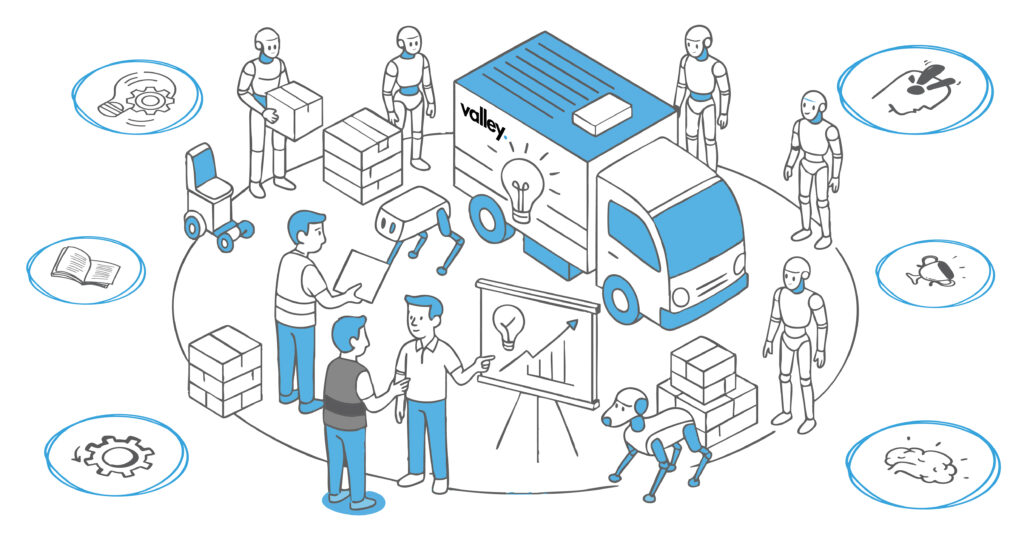Upskilling Your Team for the Tech-Driven Logistics Future

The logistics industry is changing faster than ever. Artificial intelligence, automation, and digital platforms are reshaping how fleets operate. However, technology alone does not guarantee success. Real progress comes from upskilling in logistics, ensuring your people know how to use these tools effectively and confidently.
Quick Answer
Upskilling in logistics helps companies turn new technology into real results. When teams are trained to use systems properly, adoption improves, errors fall, and operations become faster. The fleets that invest in both people and platforms in 2025 are seeing measurable gains in safety, retention, and profitability.
Why This Issue Matters
Technology adoption is accelerating, but skill gaps are growing too. The Inbound Logistics 2025 Market Report shows that most logistics companies are investing heavily in digital tools this year, yet many still underuse their core systems.
At Manifest 2025, experts told Transport Topics that workforce readiness is now the deciding factor in digital transformation success. And as FleetOwner points out, upskilled teams deliver faster results, higher adoption rates, and stronger customer service.
In short, the logistics industry’s biggest opportunity in 2025 is not just new technology, it’s people who know how to use it.
When Tech Alone Falls Short
A regional brokerage installed a new transport management system, expecting instant improvement. But dispatchers kept using spreadsheets, reports sat ignored, and operations barely changed.
Once leadership shifted focus to upskilling their logistics team, results improved. Managers led workshops, created easy reference sheets, and encouraged questions. Within one year, productivity rose 25 percent. The software was powerful all along, but skills unlocked its potential.
Training Should Be Continuous, Not One-Time
Many fleets treat training as a one-time launch event, then move on. That approach doesn’t work in 2025. Tools evolve, features change, and customer needs shift constantly. Continuous upskilling in logistics ensures your workforce keeps pace with every update.
How to make training stick:
- Host ongoing workshops: Use real workflows and data instead of presentations.
- Build quick-reference guides: Keep them digital and accessible for dispatchers and drivers.
- Encourage peer mentoring: Let experienced staff coach new hires.
- Offer short micro sessions: Ten-minute refreshers work best between shifts.
- Connect skills to KPIs: Show how training directly improves service and compliance metrics.
- Update regularly: Match training schedules with system or regulatory updates.
When learning becomes a regular habit, performance improves across the board.
Smarter Training, Safer Operations
Upskilling in logistics is also a safety strategy. Trained employees make fewer routing and compliance errors. They understand how to document loads, use in-cab systems, and manage exceptions effectively. Fleets that combine modern tech with skilled teams are reporting fewer claims, lower insurance costs, and more reliable performance.
Building a Learning Culture
The companies leading logistics in 2025 don’t just roll out technology, they build cultures of learning. They make growth part of their identity.
To build that culture:
- Talk about skill development in every team meeting.
- Recognize employees who master new tools.
- Track adoption and progress metrics alongside revenue.
- Encourage cross-department mentoring to share insights.
When upskilling becomes routine, innovation becomes easier, faster, and more sustainable.
Real-World Examples
- Continuous Coaching: A carrier launched weekly 15-minute digital training sessions. Within six months, safety incidents dropped by 18 percent.
- Peer Learning: A freight brokerage created an internal “mentor of the month” program. Employee engagement scores increased significantly.
- Faster Onboarding: A warehouse added short app-based training for new hires. Time to full productivity fell by 30 percent.
The Business Benefits of Upskilling in Logistics
- Higher Efficiency: Teams complete workflows faster and with fewer errors.
- Improved Safety: Reduced compliance violations and accident rates.
- Better Retention: Employees stay longer when they see clear growth paths.
- Lower Costs: Less downtime and fewer rework expenses.
- Customer Trust: Faster communication and more accurate updates.
Common Mistakes to Avoid
- Holding one-time training sessions without follow-up.
- Overloading sessions with unnecessary features.
- Ignoring driver and dispatcher feedback.
- Failing to measure adoption and impact.
Looking Ahead
Digital transformation is not slowing down. AI, automation, and predictive analytics will continue shaping logistics operations. But success depends on how quickly your people can adapt.
The fleets that thrive in 2025 will be those that invest in upskilling in logistics, building confident, capable teams that turn tools into real results.
FAQs
Why is upskilling in logistics important in 2025?
- It helps companies stay competitive as new technologies redefine workflows and compliance standards.
How often should teams be retrained?
- Short monthly refreshers and quarterly workshops are the most effective mix.
Can small fleets upskill affordably?
- Yes. Peer training and brief, role-based lessons are both low-cost and effective.
Does training improve safety and compliance?
- Absolutely. Skilled employees make less documentation and routing errors.
How can we measure ROI on training?
- Track time saved, error reduction, adoption rates, and customer satisfaction metrics.
Final Thoughts
Technology is only as powerful as the people behind it. When your team is confident and skilled, systems perform better, customers notice, and safety improves. Upskilling in logistics is not a cost, it is an investment in long-term success.
If your fleet is introducing new software or automation tools this year, make training part of your rollout plan. Start by assessing skill gaps, setting goals, and scheduling ongoing sessions. Empower your people, and your technology will take care of the rest.
Smarter Coverage. Real Support. No Hassle.
